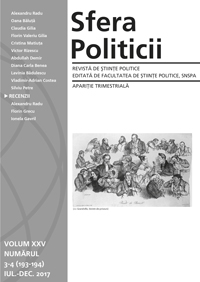Luminarea și Pacea eternă: problematizări privind proiectele filosofice kantiene
Armenians on Azerbaijanis in the Nagorno-Karabakh Conflict. Shaping the Image of the Enemy
Author(s): Vladimir-Adrian CosteaSubject(s): Politics / Political Sciences
Published by: Fundaţia »Societatea Civilă« (FSC)
Keywords: Aufklärung;Eternal Peace;Immanuel Kant;human nature;international political scene
Summary/Abstract: This paper aims to critically analyze the major projects of Kantian philosophy in relation to the ideal of Aufklärung and the establishment of Eternal Peace. The main objective of the research is to analyze the originality and boundaries of Kantian projects both at the level of the practical (moral) rationale and at the level of the relations of power and interests of the state actors on the international political scene. We aim to identify the boundaries of the Kantian approach in order to establish Eternal Peace, applying the logic of the power relations existing on the international political scene. The secondary objective of the research is to identify how the individual and the state are projected into Kantian philosophy.The original aspect of this article is the decoding of Kantian critical thinking in relation to the project of Aufklärung and the establishment of Eternal Peace. The main result of the research is that the tension of reasoning applied by philosopher Immanuel Kant regarding the definition of human nature and the relationship of forces on the international political scene. Applying the practical (moral) rationale used to define the individual’s inclination to get out of the minority state (by knowledge) becomes problematic at the time of the Kantian approach to justify the (political) necessity of Eternal Peace.
Journal: Sfera Politicii
- Issue Year: XXV/2017
- Issue No: 193-194
- Page Range: 76-83
- Page Count: 8
- Language: Romanian

